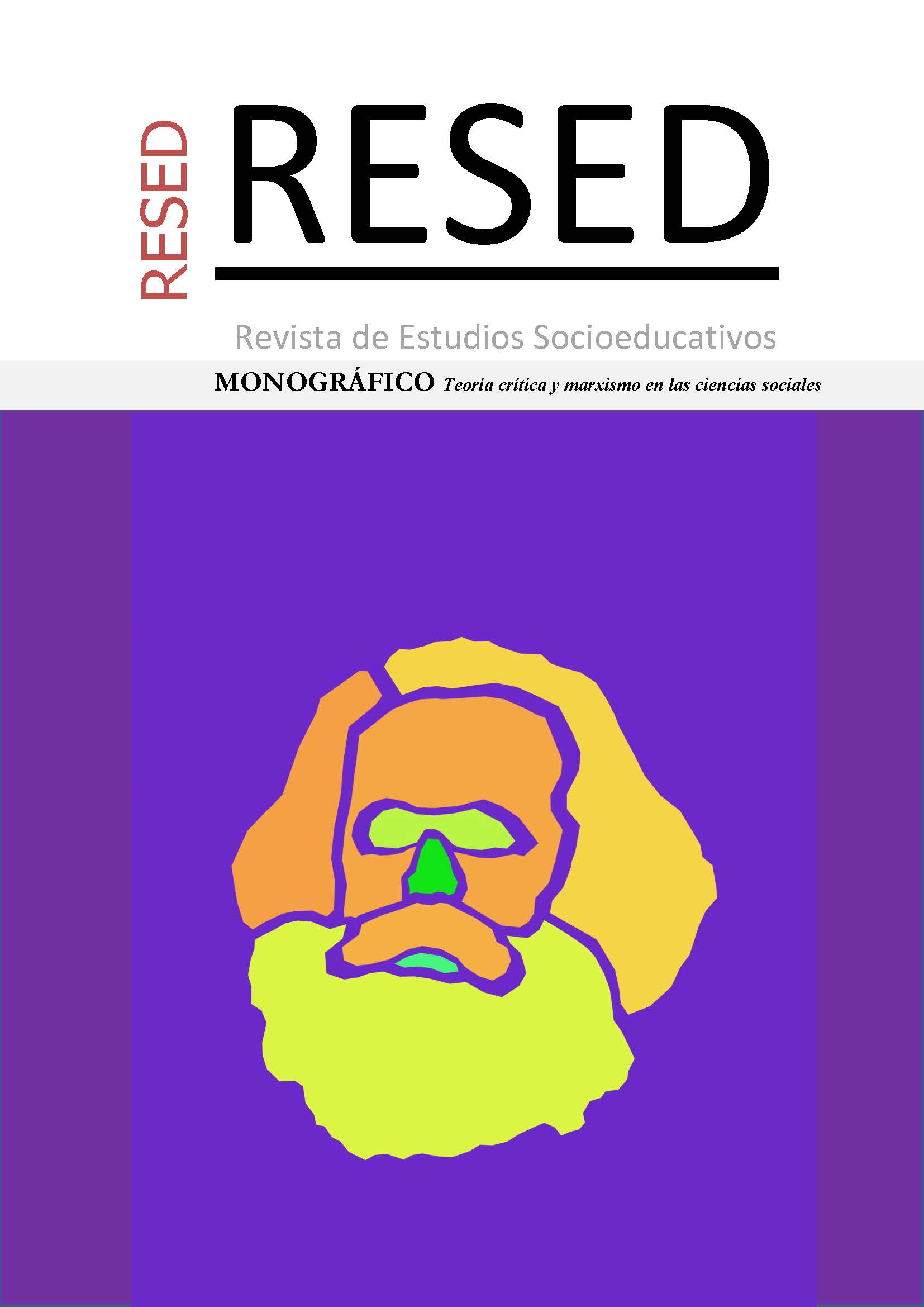The social sciences can no longer have merchant’s ear

DOI
https://doi.org/10.25267/Rev_estud_socioeducativos.2023.i11.12Info
Abstract
Social sciences are called upon to play a more important role than ever before. The challenges are manifold and of crucial importance for the future of humankind: from growing social inequalities to climate and pandemic emergencies, from current post-democratic drifts and authoritarian temptations to the risks of digital surveillance systems and artificial intelligence. They will only be able to do so if they break with the hegemony of the neoliberal paradigm of market competition, that is, if they stop “making merchant’s ears” and open themselves to new priorities, values and needs. This contribute aims to draw a new agenda for the social sciences in the so-called Anthropocene era, starting from the realisation that humanity can no longer arrogantly represent itself as the master of the planet, rather must begin to think and act as nothing more than one of the many, heterogeneous and entangled hosts.
Keywords
Downloads
How to Cite
License

This work is licensed under a Creative Commons Attribution-NonCommercial 4.0 International License.
References
Alvesson, M. y Sandberg, J. (2014). Habitat and Habitus: Boxed-in versus Box-Breaking Research. Organization Studies, v. 35, n. 7, pp. 967-987, 2014, disponible en la página web https://doi.org/10.1177/0170840614530916
Alvesson, Mats, Gabriel, Yannis y Paulsen, Roland (2017). Return to Meaning. A Social Science with Something to Say, Oxford, Oxford University Press.
Boltanski, L. (2014). De la crítica. Compendio de sociología de la emancipación. Madrid: Akal.
Borrelli, D. (2015). Contro l’ideologia della valutazione. L’ANVUR e l’arte della rottamazione dell’università. Milano: Jouvence.
Borrelli, D. y Giannone, D. (2019). La neovalutazione al governo della società. Cartografie sociali. N. 8, pp. 7-35 disponible en la página internet https://universitypress.unisob.na.it/ojs/index.php/cartografiesociali/article/view/755
Borrelli, D. y Stazio, M. (2021). Desigualdad de género en el profesorado universitario italiano y el fracaso de las políticas meritocráticas. Revista De Estudios Socioeducativos. ReSed, n. 9, pp. 41-60, disponible en la página web https://revistas.uca.es/index.php/ReSed/article/view/7235
Cingari, S. (2020). La meritocrazia. Roma: Ediesse.
Clark, H. y Johnson Sirleaf, E. (Ed.) (2021a) COVID-19: Make it the Last Pandemic. By The Independent Panel for Pandemic Preparedness & Response, disponible en la página web https://theindependentpanel.org/wp-content/uploads/2021/05/COVID-19-Make-it-the-Last-Pandemic_final.pdf
Clark, H. y Johnson Sirleaf, E. (Ed.) (2021b). Losing time: End this Pandemic and Secure the Future. Progress six months after the report of the Independent Panel for Pandemic Preparedness and Response. Disponible en la página web https://theindependentpanel.org/wp-content/uploads/2021/11/COVID-19-Losing-Time_Final.pdf
Crawford, K. (2021). Atlas of AI. Power, Politics, and the Planetary Costs of Artificial Intelligence. New Haven and London: Yale University Press.
Crouch, C. (2004). Posdemocracia. Barcelona: Taurus.
Davies, W. (2019). Estados nerviosos. Cómo las emociones se han adueñado de la sociedad. Ciudad de México: Sexto Piso.
Fisher, M. (2016), Realismo capitalista. ¿No hay alternativa?. Buenos Aires: Caja Negra.
Fraser, N. y Jaeggi, R. (2018). Capitalism. A Conversation in Critical Theory. Medford MA: Polity.
Haraway, D. J. (2020). Seguir con el problema. Generar parentesco en el Chthuluceno. Bilbao: Consonni.
Judt, T. (2016). Algo va mal. Barcelona: Taurus.
Latour, B. (2021). Où suis-je? Leçons du confinement à l’usage des terrestres. Paris: Éditions La Dècouverte (trad. Italiana: Dove sono? Lezioni di filosofia per un pianeta che cambia, Torino: Einaudi 2022).
Laval, C. (2007). L’homme économique. Essai sur les racines du néoliberalisme. Paris: Gallimard.
Malm, A. (2020a). Capital fósil. El auge del vapor y las raíces del calentamiento global. Madrid: Capitán Swing.
Malm, A. (2020b). El murciélago y el capital. Coronavirus, cambio climático y guerra social. Madrid: Errata Naturae.
Marx, K. (1845). Tesis sobre Feuerbach sobre la produccion de la conciencia. Madrid: Ediciones del Orto, 1999.
Moore, S., Hill, E. M., Dyson, L., Tildesley, M. J. y Keeling, M. J. (2022). Retrospectively modeling the effects of increased global vaccine sharing on the COVID-19 pandemic. Nature Medicine, v. 28, n. 11, pp. 2416-2423, disponible en la página web https://doi.org/10.1038/s41591-022-02064-y.
Morozov, E. (2013). To Save Everything, Clich Here. The folly of technological solutionism. New York: PublicAffairs.
Morton, T. (2017). Humankind. Solidarity with Nonhuman People. London and New York: Verso.
O’Neil, C. (2018). Armas de destrucción matemática. Cómo el Big Data aumenta la desigualdad y amenaza la democracia. Madrid: Capitán Swing.
Park, M., Leahey, E. y Funk, R. J. (2023). Papers and patents are becoming less disruptive over time. Nature, n. 613, pp. 138-144, disponible en la página web https://doi.org/10.1038/s41586-022-05543-x
Piketty, T. (2015). La economia de las desigualdades. Cómo implementar una redistribución justa y eficaz de la riqueza. Barcelona: Anagrama.
Rifkin, J. (2022). The Age of Resilience. Reimagining Existence on a Rewilding Earth. New York: St. Martin’s Press, 2022.
Sandel, M. (2020). La tiranía del mérito. ¿Qué ha sido del bien común?. Barcelona: Editorial Debate.
Singer, M. (2009). Introduction to Syndemics: A Systems Approach to Public and Community Health. San Francisco, CA: Jossey-Bass.
Vázquez Dominguez, C., Pérez-González, A-B. y Salzano, D. (2020), Cambio y coronavirus. Representaciones sociales. Burla, silencio y miedo. Sevilla: Editorial Aula Magna Proyecto Clave McGraw Hill.
Wright Mills, C. (1959). The Sociological Imagination. Oxford: Oxford University Press (trad. Italiana: L’immaginazione sociologica, Milano, il Saggiatore 2014).
Zuboff, S. (2020). La era del capitalismo de la vigilancia. La lucha por un futuro humano frente a las nuevas fronteras del poder. Barcelona: Paidós, 2020.






